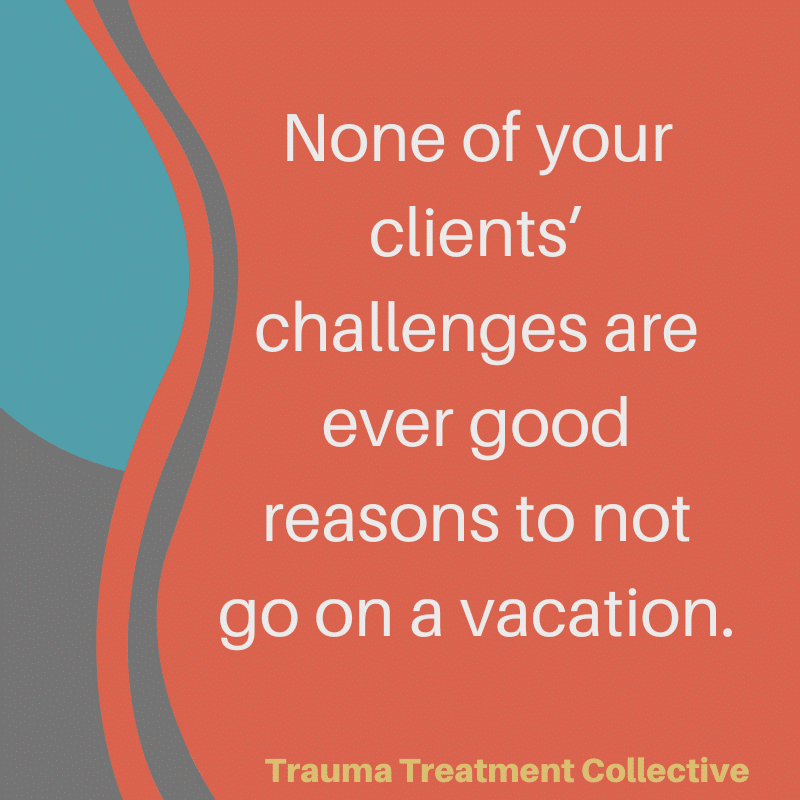Self-care is vital as we walk with our clients through their trauma healing. There are many ways to do self-care, and we are all different when it comes to our self-care needs. What works for you might not work for me and vice versa. One thing I do know that is true for us all – if we are not intentional about planning our self-care, the nature of the work won’t offer us an opportunity for self-care on its own.

In this blog, we will be specifically looking at vacations as a form of self-care and how to properly prepare your clients for your time away. So let’s start by taking a moment to think of the last time you vacationed. How long did you vacation for? How did you prepare your clients? Were you available for emergencies or were you totally off the grid? How do you feel your clients handled the time off from regular services?
Over the years, I’ve been pleased with the outcome of my time off, but there have also been times that I was not so pleased with how things unfolded. The latter times were great opportunities for me to learn and grow my skills in how I prepare my trauma clients for my vacations.

Here are a couple of things to keep in mind for trauma clients when thinking about preparation for vacation. First, remember that trauma clients can be sensitive to change and transition. Any time things change or shift, it can stir up a sense of loss, lack of control, etc. Second, be mindful of clients who also have attachment challenges alongside their trauma histories and how this time away will affect them. Some clients might feel loss without your normal sessions, and others might start to push away weeks before the vacation comes. I find these times to be good opportunities to address these attachment challenges head on. Lastly, none of your clients’ challenges are ever a good enough reason for you to not take the time off you need for self-care. With enough time and intention, we can help clients find support outside of you.
Below we are going to discuss some tips you can use to help you prepare your trauma clients, but as we are growing and developing in our skills, you might notice there is a lot of fear around leaving your clients. If you come to the end of this blog and you still don’t feel confident in your abilities to prepare your clients for your time away, you can always utilize our individual consult services to talk through specific client concerns or general fears you are struggling with related to taking time off. Learn more about our individual consults here.

Here are five tips to help your trauma clients breeze through your time off:
1. Prepare your trauma client ahead of time. I start out orienting my clients to vacations I know I have already planned in the initial intake. I like to take a month off in the summer, and because I plan larger chunks of time off, it feels fair to notify the client before they start services with me. By doing this, it gives my client and me a chance to talk about how we will handle that time. This helps the client make an informed decision about working with me.
For my holiday vacations or smaller periods of time off, I don’t like to talk about those too early because they can cause unnecessary anxiety for the client and steal the focus from the work at hand. I am also mindful to not wait too long either. I have found that informing them two weeks ahead of time is just about right. That time frame gives you a week to talk with the client about the time off and what they might need, and then the following week you can create or review a crisis/self-regulation plan with each client to ensure they have what they need in place.
Make sure to be clear with your clients about if you will or will not be available for emergencies during your time off.
2. Create or review crisis plans with each client. Making sure they have resources on hand can be very comforting for you and for them. Here is the crisis plan I use. It is adapted from the Stanley Brown Safety Plan. I like to add local crisis numbers as well as chat and text options for national crisis lines.
If you need more training on working with suicidality and crisis planning with trauma clients, consider purchasing this webinar Expanding Comfort in Discomfort: Navigating Suicidality, Safety Planning, and Being Present in the Hardest Moment.
3. Encourage clients to keep their appointment time open for mental health check-ins and self-care activities. I like to encourage my clients to use the time that we would normally meet to review their crisis plan and check-in on their stabilization. I ask them to keep that time open as much as possible and use it as a mental health check-in time. I review with them how they can use their crisis plan to walk them through the check up. I also encourage them to use that time to do things that are pleasant for them.
4. Consider swapping vacation coverage with a colleague. It is nice to have a relationship with another trauma treatment professional that you can exchange coverage with if needed. Not all of your clients will feel comfortable going without services. In those cases, you can set them up with the coverage professional in your absence, or they can be there in case of an emergency. Make sure to clarify with your coverage professional what services they are able to provide and then make sure to communicate that with your clients. It is important that clients have realistic expectations.
5. Remember you are modeling rest and self-care for your clients. It is important for them to see what it looks like to take time off and prioritize that in their lives. Many of our clients haven’t had self-care modeled for them.
Hopefully this is helpful. It is important to be intentional about your own self-care and preparing your clients for your time away. The more we are intentional, the smoother it will go for our trauma clients. They will feel well-prepared, which directly increases their sense of safety. With their sense of safety increased, they are more likely to maintain mental health stability.
I am hoping for restful, restorative, and rejuvenating time off for you in the near future. If you are interested in learning more about virtual and live retreat opportunities that we are hosting, feel free to sign up for more information here.

